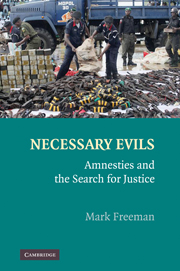Book contents
- Frontmatter
- Contents
- Preface
- Acknowledgments
- Abbreviations and Legal Terms
- Opening Considerations: On the Perennial Relevance of Amnesties
- Part I The Debate on Amnesties
- Part II The Design of Amnesties
- Final Considerations: On the Perennial Contestation of Amnesties
- Appendix 1 Summary Guidelines for Effective Amnesty Design
- Appendix 2 Selected Excerpts from International Legal Instruments
- Appendix 3 Selected Excerpts from Jurisprudence on Amnesties
- Notes
- Index
Opening Considerations: On the Perennial Relevance of Amnesties
Published online by Cambridge University Press: 04 May 2010
- Frontmatter
- Contents
- Preface
- Acknowledgments
- Abbreviations and Legal Terms
- Opening Considerations: On the Perennial Relevance of Amnesties
- Part I The Debate on Amnesties
- Part II The Design of Amnesties
- Final Considerations: On the Perennial Contestation of Amnesties
- Appendix 1 Summary Guidelines for Effective Amnesty Design
- Appendix 2 Selected Excerpts from International Legal Instruments
- Appendix 3 Selected Excerpts from Jurisprudence on Amnesties
- Notes
- Index
Summary
There are few issues of law and policy as complex and divisive as the question of when and whether to grant amnesties for atrocities. Across the centuries and across the globe, the issue has been faced on innumerable occasions. Yet there is something particular about how it has been confronted in the past several decades that is unlike prior eras. In my view, that “something” has at least two parts: first is the rise of international human rights and international criminal law, which have abridged the scope of state sovereignty and made it impossible to see the amnesty issue in purely political terms; second is the emergence of global information and communications technologies, which have made it easier to mobilize international opinion and action about national traumas that give rise to amnesty dilemmas. These two developments make the resolution of the amnesty question a fundamentally different undertaking from earlier times.
Yet even within this modern era of international law and technological advances, at least two distinct periods can be identified. For simplicity's sake, we could describe these as the amnesty-approval period and the amnesty-disapproval period. These periods are neatly captured in the pioneering work of Louis Joinet, an influential French magistrate and international law expert.
Joinet's part in the story begins in 1983. In that year, the UN Sub-Commission on Prevention of Discrimination and Protection of Minorities, “having become aware of the importance that the promulgation of amnesty laws could have for the safeguard and promotion of human rights and fundamental freedoms,” requested Joinet (at the time a UN human rights special rapporteur) to prepare a technical study on the topic.
- Type
- Chapter
- Information
- Necessary EvilsAmnesties and the Search for Justice, pp. 1 - 9Publisher: Cambridge University PressPrint publication year: 2009



